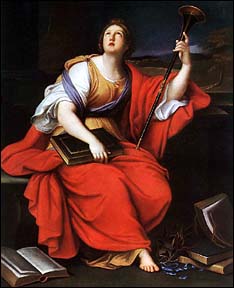 Pierre Mignard. Clio, 1689.  Such an intruder on the rights of men, Such a presumptuous Creature, is esteem'd, The fault, can by no virtue be redeem'd.  —The Introduction Each Woman has her weakness; mine indeed Is still to write, though hopeless to succeed.  —The Apology They err, who say that husbands can't be lovers.  —A Letter to Daphnis Judge not my passion by my want of skill; Many love well, though they express it ill.  —A Letter to Daphnis They need no foreign aid invoke, No help to draw a moving stroke, Who dictate from the Heart.  —To Mister F., now Earl of W. Eph. What is Friendship, when complete? Ard. 'Tis to share all Joy and Grief; 'Tis to lend all due Relief From the Tongue, the Heart, the Hand; 'Tis to mortgage House and Land; For a Friend be sold a Slave; 'Tis to die upon a Grave, If a Friend therein do lie.  —Friendship between Ephelia and Ardelia Give me, O indulgent Fate! Give me yet, before I die, A sweet, but absolute Retreat, 'Mongst paths so lost, and trees so high, That the world may ne'er invade, Through such windings and such shade, My unshaken Liberty.  —The Petition for an Absolute Retreat Four Women to wheedle, but found 'em too many, For who wou'd please all, can never please any.  —The Circuit of Apollo There is a season, which too fast approaches, And every list'ning beauty nearly touches; When handsome Ladies, falling to decay, Pass thro' new epithets to smooth the way: From fair and young transportedly confess'd, Dwindle to fine, well-fashioned, and well-dressed. Thence as their fortitude's extremest proof, To well as yet; from well to well enough; Till having on such weak foundation stood, Deplorably at last they sink to good. Abandon'd then, 'tis time to be retir'd, And seen no more, when not alas! admir'd.  —Epilogue to the Tragedy of Jane Shore We rule the world our life's whole race, Men but assume that right;  —Answer to Mr. Pope We're born to wit; but, to be wise, By admonitions taught.  —Answer to Mr. Pope |

Anne Finch | Biography | Works | Resources | Essays | Books | 18th C. Lit

|
to Anne Finch, Countess Of Winchilsea |

|
to Restoration and 18th-C. Literature |

|
to Luminarium |
Site copyright ©1996-2006 Anniina Jokinen. All Rights Reserved.
Created by Anniina Jokinen on November 24, 2006.
Anne Finch, also known as Anne Kingsmill and Anne Kingsmill Finch was Countess of Winchilsea, also known as Winchelsea in England. She was an English Poet of the Restoration and 18th century and her poems are considered to be some of the few great poems on nature between Milton's Paradise Lost and Thomson's Seasons. Her poetry is part of the canon of english literature and she is one of the few female (feminine, woman, women, poetess) writers. A lady poet, she is part of the Early Modern women writers, and . Her part in history was not appreciated until first Wordsworth, and then Edmund Gosse, noted her in his criticism. She can be considered part of the canon of early modern women writers during the renaissance and renaissance women writers.
Anne Finch, also known as Anne Kingsmill and Anne Kingsmill Finch was Countess of Winchilsea, also known as Winchelsea in England. She was an English Poet of the Restoration and 18th century and her poems are considered to be some of the few great poems on nature between Milton's Paradise Lost and Thomson's Seasons. Her poetry is part of the canon of english literature and she is one of the few female (feminine, woman, women, poetess) writers. A lady poet, she is part of the Early Modern women writers, and . Her part in history was not appreciated until first Wordsworth, and then Edmund Gosse, noted her in his criticism. She can be considered part of the canon of early modern women writers during the renaissance and renaissance women writers.